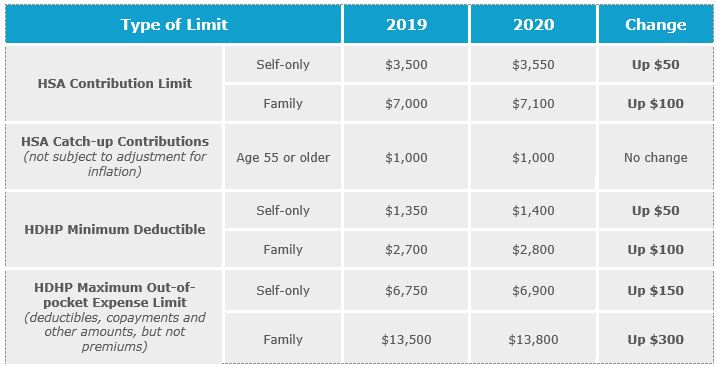
HIGHLIGHTS
- Each year, the IRS announces inflation-adjusted limits for HSAs and HDHPs.
- The adjusted contribution limits for HSAs take effect as of Jan. 1, 2020.
- The adjusted HDHP cost-sharing limits (minimum deductible and maximum out-of-pocket) take effect for the plan year beginning on or after Jan. 1, 2020.
IMPORTANT DATES
January 1, 2020
The new contribution limits for HSAs become effective.
2020 Plan Years
The HDHP cost-sharing limits for 2020 apply for plan years beginning on or after Jan. 1, 2020.
OVERVIEW
On May 28, 2019, the IRS released Revenue Procedure 2019-25 to announce the inflation-adjusted limits for health savings accounts (HSAs) and high deductible health plans (HDHPs) for 2020. These limits include:
- The maximum HSA contribution limit;
- The minimum deductible amount for HDHPs; and
- The maximum out-of-pocket expense limit for HDHPs.
These limits vary based on whether an individual has self-only or family coverage under an HDHP.
The IRS limits for HSA contributions increase for 2020. Eligible individuals with self-only HDHP coverage will be able to contribute up to $3,550 for 2020, while eligible individuals with family HDHP coverage will be able to contribute up to $7,100 for 2020. The HDHP cost-sharing limits also increase for 2020.
ACTION STEPS
Because the cost-sharing limits for HDHPs change for 2020, employers that sponsor these plans may need to make plan design changes for plan years beginning in 2020. Also, employers that allow employees to make pre-tax HSA contributions should confirm that their benefit election forms have been updated for the HSA contributions limits for 2020.
HSA/HDHP Limits
The following chart shows the HSA and HDHP limits for 2020 as compared to 2019. It also includes the catch-up contribution limit that applies to HSA-eligible individuals who are age 55 or older, which is not adjusted for inflation and stays the same from year to year.

This Compliance Bulletin is not intended to be exhaustive nor should any discussion or opinions be construed as legal advice. Readers should contact legal counsel for legal advice.
© 2019 Zywave, Inc. All rights reserved.





